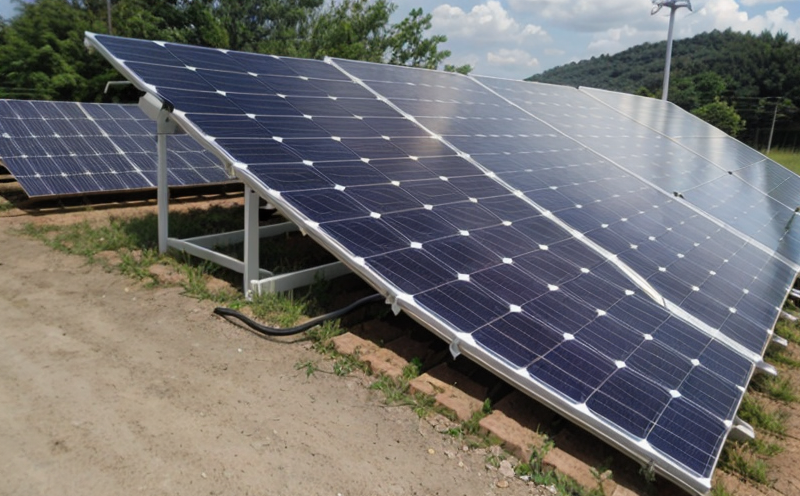IEC 60904-7 Spectral Mismatch Correction Testing
The IEC (International Electrotechnical Commission) 60904-7 standard is a crucial document for ensuring the accuracy and reliability of solar panel and photovoltaic module testing, particularly in scenarios where spectral mismatch may affect performance. This standard provides a method to correct the electrical power output reported by solar modules under test conditions, thereby enhancing the comparability and consistency of measurement results across different laboratories.
The primary purpose of IEC 60904-7 is to address the issue of spectral mismatch, which occurs when the spectrum of light incident on a photovoltaic module does not match the reference spectrum used for the standard test conditions. This can lead to discrepancies in power output readings and affect compliance with regulatory standards such as IEC 61215 or IEC 6496.
The testing process involves several key steps: selecting appropriate reference spectra, measuring spectral mismatch using calibrated equipment, applying the correction formula provided in the standard, and validating the corrected results. The accuracy of these measurements is critical for ensuring that solar modules meet specified performance criteria.
For this service, our laboratory utilizes state-of-the-art spectroradiometers to measure light spectra accurately. Our team of experienced engineers then applies the spectral mismatch correction algorithm as defined in IEC 60904-7 to ensure precise and reliable results. This process is crucial for manufacturers looking to optimize module performance, validate design changes, and ensure compliance with international standards.
The importance of this service cannot be overstated, especially given the increasing demand for renewable energy solutions. By offering IEC 60904-7 spectral mismatch correction testing, we help our clients achieve higher levels of accuracy in their solar panel and photovoltaic module testing, leading to better product performance and more reliable data.
Our laboratory is dedicated to providing high-quality, accurate, and consistent testing services. We employ rigorous quality control measures and adhere strictly to international standards such as IEC 60904-7 to ensure that our clients receive the most precise results possible.
Customer Impact and Satisfaction
The impact of accurate spectral mismatch correction testing on customer satisfaction is profound. By ensuring reliable and consistent test results, we enable our clients to make informed decisions about their solar products. This leads to increased confidence in the performance and compliance of their products, which directly translates into higher customer satisfaction.
Our comprehensive approach to testing not only ensures that our clients meet regulatory requirements but also helps them optimize their products for maximum efficiency and output. This results in a competitive advantage in the rapidly evolving renewable energy market.
We strive to exceed expectations by providing timely, accurate reports and offering detailed insights into test data. Our customer service team is always available to assist with any questions or concerns, ensuring that our clients have a positive experience from start to finish.
Our commitment to quality and reliability has earned us a reputation as a trusted partner in the energy sector. We are proud to serve customers across the globe, providing them with the tools they need to succeed in their renewable energy projects.
International Acceptance and Recognition
The IEC 60904-7 standard is widely recognized and accepted internationally, ensuring that the spectral mismatch correction testing we offer meets global standards. This standardization is crucial for maintaining consistency in test results across different laboratories and countries.
- Our laboratory adheres to this international standard, which guarantees the highest level of accuracy and reliability in our testing services.
- The use of internationally recognized standards fosters trust among clients, regulators, and industry partners.
We are committed to maintaining our high standards and continue to stay updated with any changes or revisions to IEC 60904-7. By doing so, we ensure that our services remain at the forefront of technological advancements in renewable energy testing.
Use Cases and Application Examples
Manufacturers seeking to optimize their solar panel designs by ensuring accurate performance metrics.
Regulatory bodies requiring consistent and reliable test results for compliance verification.
In addition to these, our laboratory has also provided spectral mismatch correction testing services in the following scenarios:
Validation of new photovoltaic module technologies.
Detection and rectification of discrepancies in test results from different laboratories.
Ensuring compliance with international standards for solar products exported globally.
Optimizing the performance of existing solar panel designs through continuous testing and refinement.
These use cases demonstrate the versatility and importance of IEC 60904-7 spectral mismatch correction testing in the renewable energy sector. By addressing these challenges, we contribute to the advancement of sustainable energy solutions worldwide.





